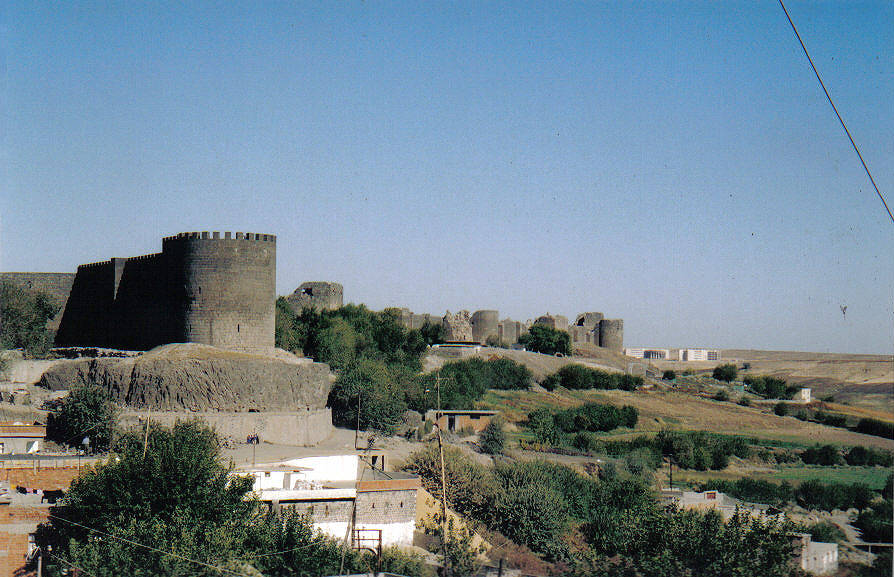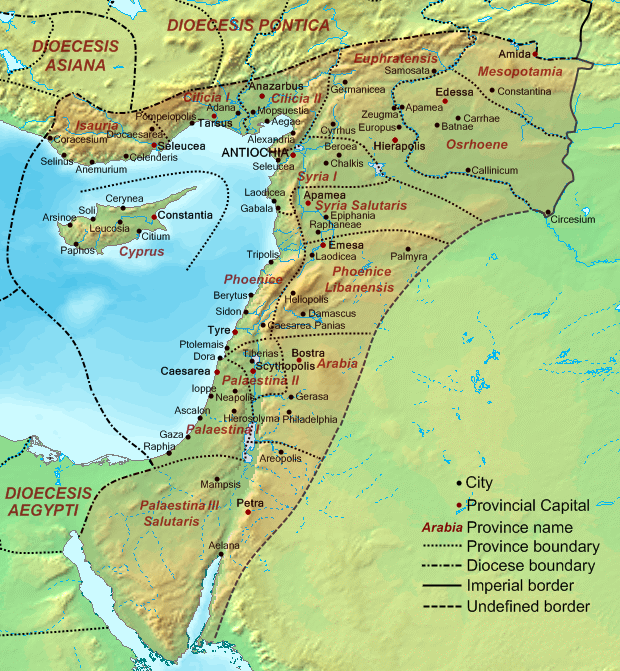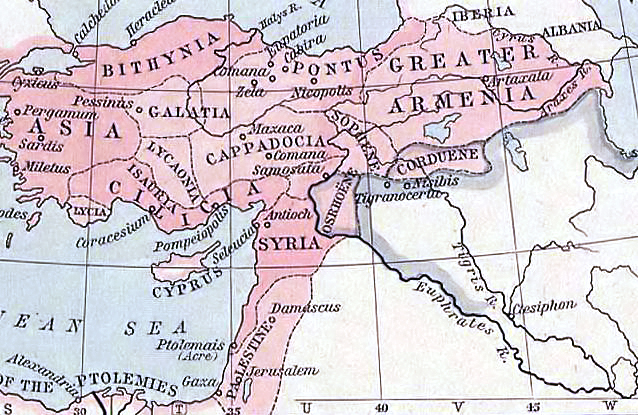|
Ammianus Marcellinus
Ammianus Marcellinus, occasionally anglicized as Ammian ( Greek: Αμμιανός Μαρκελλίνος; born , died 400), was a Greek and Roman soldier and historian who wrote the penultimate major historical account surviving from antiquity (preceding Procopius). Written in Latin and known as the '' Res gestae'', his work chronicled the history of Rome from the accession of Emperor Nerva in 96 to the death of Valens at the Battle of Adrianople in 378. Only the sections covering the period 353 to 378 survive. Biography Ammianus was born in the East Mediterranean, possibly in Syria or Phoenicia, around 330, into a noble family of Greek origin. Since he calls himself ''Graecus'' ( Greek), he was most likely born in a Greek-speaking area of the empire. His native language was Greek, but he also knew Latin. The surviving books of his history cover the years 353 to 378. Ammianus began his career as a military officer in the Praetorian Guard, where he gained firsthand exper ... [...More Info...] [...Related Items...] OR: [Wikipedia] [Google] [Baidu] |
Roman Syria
Roman Syria was an early Roman province annexed to the Roman Republic in 64 BC by Pompey in the Third Mithridatic War following the defeat of King of Armenia Tigranes the Great, who had become the protector of the Hellenistic kingdom of Syria. Following the partition of the Herodian Kingdom of Judea into a tetrarchy in 4 BC, it was gradually absorbed into Roman provinces, with Roman Syria annexing Iturea and Trachonitis. By the late 2nd century AD, the province was divided into Coele Syria and Syria Phoenice. Provincia Syria Syria was annexed to the Roman Republic in 64 BC, when Pompey the Great had the Seleucid king Antiochus XIII Asiaticus executed and deposed his successor Philip II Philoromaeus. Pompey appointed Marcus Aemilius Scaurus to the post of governor of Syria. Following the fall of the Roman Republic and its transformation into the Roman Empire, Syria became a Roman imperial province, governed by a Legate. During the early empire, the Roman army in Sy ... [...More Info...] [...Related Items...] OR: [Wikipedia] [Google] [Baidu] |
Phoenice (Roman Province)
Phoenice ( ; ) was a province of the Roman Empire, encompassing the historical region of Phoenicia. It was officially created in 194 AD and after , Phoenice Syria was divided into Phoenice proper or Phoenice Paralia, and Phoenice Libanensis, a division that persisted until the region was conquered by the Muslim Arabs in the 630s. Administrative history Background Phoenicia came under Roman rule in 64 BC, when Pompey created the province of Syria. With the exception of a brief period in 36–30 BC, when Mark Antony gave the region to Ptolemaic Egypt, Phoenicia remained part of the province of Syria thereafter. Emperor Hadrian (reigned 117–138) is said to have considered a division of the overly large Syrian province in 123–124 AD. Creation It was not until shortly after c. 194 AD that Septimius Severus (r. 193–211) actually undertook this, dividing the province into Syria Coele in the north and Syria Phoenice in the south. The province was much larger than the area ... [...More Info...] [...Related Items...] OR: [Wikipedia] [Google] [Baidu] |
Silvanus (magister Peditum)
Silvanus (died 7 September 355) was a Roman general and usurper of Frankish descent. He revolted in Gaul against Emperor Constantius II, claiming the imperial title for 28 days in AD 355. Origin and career Silvanus was born in Gaul, the son of Bonitus, a Laetic Frankish general who had supported Constantine I in the civil war against Licinius. Like so many other Franks of his times, and like his father before him, he was a loyal and thoroughly Romanized "barbarian" in the military service of the Empire. In AD 351, he held the rank of tribune in the army of the rebel Magnentius, and in this role he defected to Emperor Constantius II at the Battle of Mursa Major. Silvanus was soon promoted to the post of ''magister peditum'' in Gaul in 353. Gaul had been subject to raiding and looting by Alemanni tribesmen; Constantius entrusted Silvanus with the difficult task of driving the invaders back beyond the Rhine, and restoring the fast-eroding Roman authority in the province. Silvanus ... [...More Info...] [...Related Items...] OR: [Wikipedia] [Google] [Baidu] |
Magister Militum
(Latin for "master of soldiers"; : ) was a top-level military command used in the late Roman Empire, dating from the reign of Constantine the Great. The term referred to the senior military officer (equivalent to a war theatre commander, the emperor remaining the supreme commander) of the empire. The office continued to exist end evolve during the early Byzantine Empire. In Greek language, Greek sources, the term is translated either as ''strategos#Byzantine use, strategos'' or as ''stratelates'' (although these terms were also used non-technically to refer to commanders of different ranks). Establishment and development of the command The office of ''magister militum'' was created in the early 4th century, most likely when the Western Roman emperor Constantine the Great defeated all other contemporary Roman emperors, which gave him control over their respective armies. Because the Praetorian Guards and their leaders, the praetorian prefect, Praetorian Prefects, had suppor ... [...More Info...] [...Related Items...] OR: [Wikipedia] [Google] [Baidu] |
Mesopotamia (Roman Province)
Mesopotamia was the name of a Roman province, initially a short-lived creation of the Roman emperor Trajan in 116–117 and then re-established by Emperor Septimius Severus in c. 198. Control of the province was subsequently fought over between the Roman and the Sassanian Empire, Sassanian empires until the Early Muslim conquests, Muslim conquests of the 7th century. Trajan's province In 113, the Roman emperor Trajan (r. 98–117) Trajan's Parthian campaign, launched a war against Rome's long-time eastern rival, the Parthian Empire. In 114, he conquered Roman Armenia, Armenia, which was made into a province, and by the end of 115, he had conquered northern Mesopotamia. This too was organized as a province in early 116, when coins were minted to celebrate the fact. Later in the same year, Trajan marched into central and southern Mesopotamia (enlarging and completing the province of Mesopotamia) and across the river Tigris to Adiabene, which he annexed into another Roman provin ... [...More Info...] [...Related Items...] OR: [Wikipedia] [Google] [Baidu] |
Nisibis
Nusaybin () is a municipality and Districts of Turkey, district of Mardin Province, Turkey. Its area is 1,079 km2, and its population is 115,586 (2022). The city is populated by Kurds of different tribal affiliation. Nusaybin is separated from the larger Kurds, Kurdish-majority city of Qamishli by the Syria–Turkey border. The city is at the foot of the Mount Izla escarpment at the southern edge of the Tur Abdin hills, standing on the banks of the Jaghjagh River (), the ancient Mygdonius (). The city existed in the Assyrian Empire and is recorded in Akkadian language, Akkadian inscriptions as ''Naṣibīna''. Having been part of the Achaemenid Empire, in the Hellenistic period the settlement was re-founded as a ''polis'' named "Antioch on the Mygdonius" by the Seleucid dynasty after the conquests of Alexander the Great. A part of first the Roman Republic and then the Roman Empire, the city (; ) was mainly Syriac language, Syriac-speaking, and control of it was contested be ... [...More Info...] [...Related Items...] OR: [Wikipedia] [Google] [Baidu] |
Ursicinus (magister Equitum)
Ursicinus was a Roman senior military officer, holding the rank of ''Magister Equitum per Orientem'' (Master of Horse of the East) and even ''Magister Peditum Praesentalis'' in the later Roman Empire ''c.'' 349–359. He was a citizen of Antioch and was well connected in the Eastern part of the Roman Empire. Career From AD 349 to 359 he served as Magister Equitum in the East. In 351 or 352 he was entrusted with the suppression of the Jewish revolt against Constantius Gallus led by Patricius and Isaac of Diocesarea. Tiberias and Diospolis, two of the cities conquered by the rebels, were almost completely destroyed, while Diocaesarea was razed to the ground. Ursicinus also was ordered to kill several thousand rebels, even young ones.Jerome, ''Chronica'', 15-21; Theophanes, AM 5843. Service with Ammianus Marcellinus In 353, historian Ammianus Marcellinus was attached to the command of Ursicinus at his headquarters in Nisibis, where he remained until recalled in 354 by Gallus, ... [...More Info...] [...Related Items...] OR: [Wikipedia] [Google] [Baidu] |
Diocese Of The East
The Diocese of the East, also called the Diocese of Oriens, (; ) was a diocese of the later Roman Empire, incorporating the provinces of the western Middle East, between the Mediterranean Sea and Mesopotamia. During late Antiquity, it was one of the major commercial, agricultural, religious and intellectual areas of the empire, and its strategic location facing the Sassanid Empire and the nomadic tribes gave it exceptional military importance. History The capital of the diocese was at Antioch, and its governor had the special title of '' comes Orientis'' ("Count of the East", of the rank ''vir spectabilis'' and later '' vir gloriosus'') instead of the ordinary "'' vicarius''". The diocese was established after the reforms of Diocletian (r. 284–305), and was subordinate to the praetorian prefecture of the East. The diocese included originally all Middle Eastern provinces of the Empire: Isauria, Cilicia, Cyprus, Euphratensis, Mesopotamia, Osroene, Syria Coele, Phoenice, Syri ... [...More Info...] [...Related Items...] OR: [Wikipedia] [Google] [Baidu] |
Curiales
In ancient Rome, the ''curiales'' (from ''co + viria'', 'gathering of men') were initially the leading members of a gens, gentes (clan) of the city of Rome. Their roles were both civil and sacred. Each ''gens curialis'' had a leader, called a ''curio.'' The whole arrangement of assemblies was presided over by the ''curio maximus''. History The Roman civic form was replicated in the towns and cities of the empire as they came under Roman control. By the Dominate, Late Empire, ''curiales'' referred to the merchants, businessmen, and mid-level landowners who served in their local ''curia'' as local magistrates and Decurion (administrative), decurions. ''Curiales'' were expected to procure funds for public building projects, temples, festivities, games, and local welfare systems. They would often pay for these expenses out of their own pocket, to gain prestige. From the mid-third century, this became an obligation, as Constantine I confiscated the cities' endowments, local taxes and ... [...More Info...] [...Related Items...] OR: [Wikipedia] [Google] [Baidu] |
Domesticus (Roman Empire)
The origins of the word ''domesticus'' can be traced to the late 3rd century of the Late Roman army. They often held high ranks in various fields, whether it was the servants of a noble house on the civilian side, or a high-ranking military position. After serving under the emperor for a certain duration, the Domestici would be able to become leaders themselves and potentially command their own regiment of legionaries in the military. Relatively, the most important offices were the “Comes Domesticorum” also known as, “Commander of the Protectores Domestici,” and “Comes rei Militaris” or General. Origin The domestici rose to prominence during the Crisis of the 3rd Century, the myriad of societal catastrophes nearly led to the collapse of the Roman Empire. The accession of Diocletian and his subsequent reforms ended the continual strife and unstable leadership Ancient Rome had faced during this period. The title of “Domesticus” was developed to advocate for bet ... [...More Info...] [...Related Items...] OR: [Wikipedia] [Google] [Baidu] |
Julian (emperor)
Julian (; ; 331 – 26 June 363) was the Caesar (title), Caesar of the West from 355 to 360 and Roman emperor from 361 to 363, as well as a notable philosopher and author in Ancient Greek, Greek. His rejection of Christianity, and his promotion of Neoplatonic Hellenistic religion, Hellenism in its place, caused him to be remembered as Julian the Apostate in the Christian tradition. A nephew of Constantine the Great, Julian was one of few in the imperial family to survive the purges and civil wars during the reign of Constantius II, his cousin. Julian became an orphan as a child after his father was executed in 337, and spent much of his life under Constantius's close supervision. However, the emperor allowed Julian freedom to pursue an education in the Greek-speaking east. In 355, Constantius II summoned Julian to court and appointed him to rule Roman Gaul, Gaul. Julian was successful in his rule, defeating and counterattacking Germanic peoples, Germanic raids across the Rhine ... [...More Info...] [...Related Items...] OR: [Wikipedia] [Google] [Baidu] |






